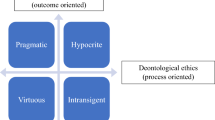Abstract
This essay praises Gerald Gaus’s The Order of Public Reason as a building block for all normative explorations into the institutional foundations of human sociability. It evaluates the normative implications put forth by Gaus in terms of the Kirzner’s “finder’s keeper’s ethic.” This raises a question about the relationship between the moral order and the political order that underlies market processes. Examining the role of entrepreneurship in the market process in relation to Kirzner’s “finder’s keeper’s principle” suggests a deeper ethical foundation that underpins the institutional conditions of “social morality.”
Similar content being viewed by others
Notes
For the purposes of this paper, we are using the terms ethical and moral interchangeably.
Munger persuasively articulates this argument in this symposium, basing the “extra-human” entity to which we refer runs analogous to what he argues as the necessity for a “Kantian Parliamentarian.”
The relationship between the notion of entrepreneurship in the Austrian School and the notion of practical wisdom in Aristotelian tradition within an institutional framework of private property, contract, and consent is beyond the scope of this paper. See Candela and Powell 2014. Markets as Processes of Moral Discovery. Studies In Emergent Order, 7: 258–272.
References
Aristotle. (2000). Nichomachean ethics, translated and edited by Roger Crisp. New York: Cambridge University Press.
Boettke, P. (1987). Virginia political economy: a view from Vienna. Market Process, 5(2), 7–15.
Boettke, P. (2011). Living better together. Cato Unbound http://www.cato-unbound.org/2011/10/17/peter-j-boettke/living-better-together
Boettke, P. (2012). Living economics: yesterday, today and tomorrow. Oakland: The Independent Institute.
Buchanan, J. M. (1965). Ethical rules, expected values, and large numbers. Ethics, 76(1), 1–13.
Buchanan, J. M. (1975). The limits of liberty: between anarchy and leviathan. Chicago: University of Chicago Press.
Candela, R., & Powell, B. (2014). Markets as processes of moral discovery. Studies In Emergent. Order, 7, 258–272.
Den Uyl, D. J. (2009). Homo moralis. Review of Austrian Economics, 22, 349–385.
Gaus, G. (2011). The order of public reason: a theory of freedom in a diverse and bounded world. New York: Cambridge University Press.
Gigerenzer, G. (2008). Rationality for mortals. New York: Oxford University Press.
Hayek, F. A. (1968 [2002]). Competition as a discovery procedure. Quarterly Journal of Austrian Economics, 5(3), 9–23.
Hayek, F. A. (1948[1980]). Individualism and economic order. Chicago: University of Chicago Press.
Horwitz, S. (2008). Monetary calculation and the extension of social cooperation into anonymity. The Journal of Private Enterprise, 23(2), 81–93.
Kirzner, I. (1973). Competition and entrepreneurship. Chicago: University of Chicago Press.
Kirzner, I. (1988). Some ethical implications for capitalism of the socialist calculation debate. Social Philosophy & Policy, 6(1), 165–182.
Lavoie, D. (1985). National economic planning: what is left? Cambridge: Ballinger Publishing.
Lomasky, L. (1990). Persons, rights and moral community. New York: Oxford University Press.
MacIntyre, A. (1981). After virtue: a study in moral theory. Notre Dame: University of Notre Dame Press.
McCloskey, D. (2007). The bourgeois virtues: ethics for an age of commerce. Chicago: University of Chicago Press.
McCloskey, D. (2010). Bourgeois dignity: why economics can’t explain the modern world. Chicago: University of Chicago Press.
Miller, F. (1983). Rationality and freedom in Aristotle and Hayek. Reason Papers, 9, 29–36.
Mises, L. (1949 [2007]). Human action: a treatise on economics. Indianapolis: Liberty Fund.
Norton, D. (1976). Personal destinies: a philosophy of ethical individualism. Princeton: Princeton University Press.
Rasmussen, D., & Den Uyl, D. (1991). Liberty and nature: an Aristotelian defense of liberal order. Chicago: Open Court.
Rasmussen, D., & Den Uyl, D. (2005). Norms of liberty: a perfectionist basis for non-perfectionist politics. University Park: The Pennsylvania State University Press.
Wall, S. (2013). Public reason and moral authoritarianism. The Philosophical Quarterly, 63(250), 160–169.
Acknowledgments
We would like to thank Douglas Den Uyl, Douglas Rasmussen, and Solomon Stein for their helpful comments on an earlier draft of this paper.
Author information
Authors and Affiliations
Corresponding author
Rights and permissions
About this article
Cite this article
Boettke, P.J., Candela, R.A. A social morality for mortals: A review essay of the order of public reason: A theory of freedom and morality in a diverse and bounded world . Rev Austrian Econ 30, 365–375 (2017). https://doi.org/10.1007/s11138-016-0360-1
Published:
Issue Date:
DOI: https://doi.org/10.1007/s11138-016-0360-1




